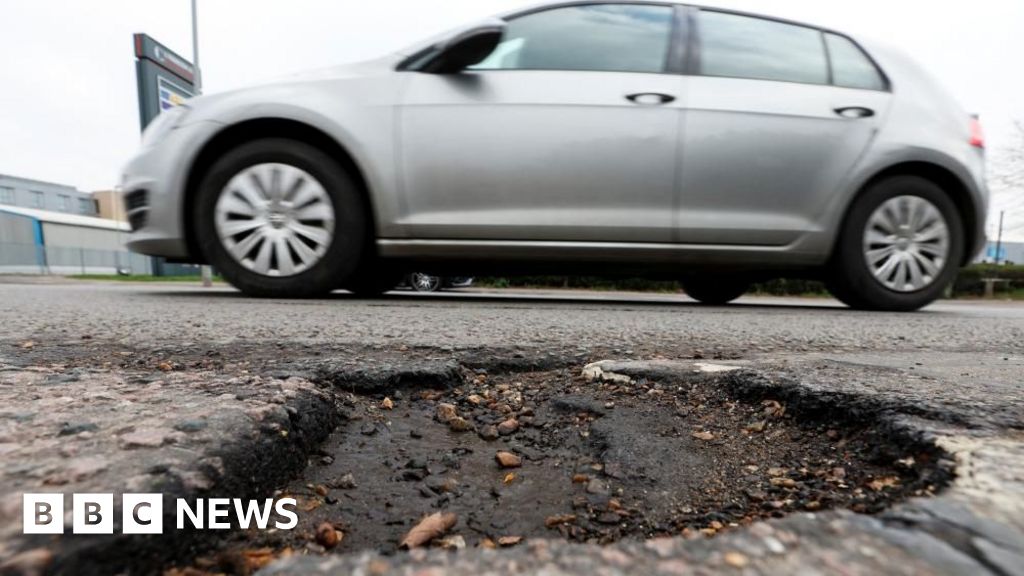‘Good chance’ Reeves will have to raise taxes in autumn budget, thinktank says – UK politics live | Politics
- Politics
- March 27, 2025
- No Comment
- 90
Institute for Fiscal Studies says there’s good chance Reeves will have to raise taxes in autumn
The Institute for Fiscal Studies has also released its considered verdict on the spring statement this morning. Like most thinktanks, it was also commenting yesterday, but the full number-crunching analysis takes a while.
Here are some of the key points from the opening presentation by Paul Johnson, the IFS’s director.
-
Johnson said that there is a good chance that Rachel Reeves will have to raise taxes in the autumn. And he claimed speculation about what taxes might rise could be economically damaging. He explained:
There is a good chance that economic and fiscal forecasts will deteriorate significantly between now and an autumn budget. If so, she will need to come back for more; which will likely mean raising taxes even further. That risks months of speculation over what those tax rises might be – a raid on pensions, a wealth tax on the richest, another hike to capital gains tax? I mention those not to commend them, far from it, but to exemplify the kinds of taxes regarding which mere speculation about increases can cause economic harm. With no sense of a tax strategy, we have no idea which way the chancellor might turn.
Reeves did not accept this when this point was put to her in interviews this morning. (See 8.07am.)
We had £9.9bn of headroom in October. We have £9.9bn of headroom today. Astonishingly the numbers are within a mere £2m of one another. It is hard to believe this is a fluke. The Treasury has clearly worked overtime to ensure that precisely the same fiscal headroom remains today as was projected in October. This is not sensible.
-
He said that, while the sickness and disability benefit cuts announced last week were “defensible” (because costs were rising so much), the decision to announce an extra £500m in cuts yesterday, just to make sure the fiscal headroom figure did not change, was a mistake.
Whilst unquestionably tough for those on the receiving end, those original cuts were defensible as a response to problems manifested by huge increases in numbers of claimants, and in spending. One could make a defence of them unrelated to the details of any particular fiscal rule. Coming back a week later with just a slightly bigger cut because that’s what’s needed to return the fiscal headroom to precisely where it was a few months ago risks undermining that case and discrediting attempts at genuine reform to the benefit system. If it was right last week to announce a halving of the health component of universal credit, it is hard to see why this week it is right to do more than that by halving it and then freezing it in cash terms.
-
He said having little fiscal headroom, and then applying the fiscal rules rigidly, was “not conducive to a sensible policymaking process”.
It is the combination of “iron-clad” pass/fail numerical fiscal rules and next to no headroom against them that is causing so many problems, leaving fiscal policy completely exposed to economic developments outside the government’s control. That is not conducive to a sensible policymaking process. This is not the OBR’s fault. It is the product of the chancellor’s choices.
Spending growth is now set to be 2.5% in 2025-26, 1.8% in 2026-27 and 1.0% in each of the subsequent three years. One should always be sceptical of plans to be prudent, but only in the future. Front-loaded or not, the problem for the chancellor is that keeping to these growth rates overall will inevitably mean cuts for some departments in the years to come.
Key events
The Labour MP Stella Creasy has said she cannot support the government’s plans to cut sickness and disability benefits. In an interview with LBC’s Andrew Marr for his 6pm show tonight, asked if she could defend the cuts, she replied:
No, I cannot. because I don’t recognise the challenge that the Chancellor paints of the economic situation that we’re in …
But because I am concerned at not just what we’ve seen today, that these proposals come when we’ve already got 4.5m families living in poverty [see 10.52am], and it will add to that poverty, that they may be counterproductive to getting the economy moving.
So, the argument that many people like me make, who want this government to succeed and who recognise the challenges they’re facing, is there maybe alternative ways forward that can both address that economic uncertainty and promote social justice.
Asked if she would vote against the plans, Creasy replied:
As it stands, I can’t support these proposals. Increasing poverty is not what any of us came into politics to do, including the government. And I think they’re economically counterproductive.
Sue Gray uses maiden Lords speech to urge politicians to halt ‘project chainsaw’-type jibes about civil servants
Sue Gray, Keir Starmer’s former chief of staff, has used her maiden speech in the House of Lords to defend civil servants from attacks by politcians – including Labour ones.
Without naming individuals, she seemed to refer directly to a recent Guardian report saying No 10 was taking a close interest in thinktank plans to reshape the state that were privately being referred to as “project chainsaw”.
Gray, who spent her career as a civil servant before joining Starmer’s team in 2023, told peers she worked with “truly heroic and committed people” when she started in Whitehall. She went on:
Today I see the same sort of brilliance. What these and other civil servants are doing is central to the government’s and the nation’s mission to bring back growth into our economy and security to our society.
That is why I would caution all of us to be careful, not just about our decisions but our language.
When we hear the phrases, ‘blobs’, ‘pen-pushers’, ‘axes’, ‘chainsaws’ and other implements, they hear it too.
John Crace, the Guardian’s sketchwriter, was listening to Rachel Reeves on her morning interview round too. He’s written about it here.
The Runcorn and Helsby byelection will take place on 1 May, coinciding with the local elections, it has been confirmed today.
Ninja sword ban due to become law by summer, Home Office says
A ban on ninja swords campaigned for by the family of a murdered teenager is set to come into force by summer, PA Media reports. PA says:
It will be illegal to possess, sell, make or import the weapon from 1 August as the final part of anti-knife crime measures introduced under Ronan’s Law, named after Ronan Kanda.
His mother, Pooja Kanda, has campaigned for a law change after her 16-year-old son was yards away from his Wolverhampton home when he was murdered with a ninja sword in 2022.
The move to ban the blades was being laid before parliament today and will come into force in the summer once it has gained approval in parliament.
Anyone caught with a ninja sword in private could face six months in prison, set to increase to two years under plans in the crime and policing bill.
The weapons can be handed over in knife-surrender bins or local police stations under a surrender scheme running in July.
No ninja swords bought after Thursday will be eligible for compensation as part of efforts to stop exploitation of the scheme, the Home Office said.
Under Ronan’s Law, the Home Office has also announced a raft of measures including making retailers report bulk or suspicious sales to police, and increasing the jail sentence for selling weapons to children, or illegal blades such as zombie knives, to two years.
Badenoch claims Tories lost last election partly due to their ‘technocratic managerialism’
Kemi Badenoch has claimed that the Conservative party lost the last election because of its “technocratic managerialism”.
She used the line in a speech today at a conference run by Anthropy, a leadership organisation.
In the past Badenoch has argued that the Tories lost in 2024 because they “taked right, but governed left”.
But today she offered a slightly different take, which may surprise Britons who remember Brexit, Boris Johnson and Liz Truss. She told the audience:
One of the reasons my party is out of office is because we forgot what we were about and opted for a technocratic managerialism that didn’t inspire anyone and didn’t tell a story about who we are and how we make the world a better place.
The Conservative party is now under new leadership and one of the things I want us to do is remember the social value of business and enterprise.
Badenoch said that other politicians gave speeches claiming to support business, only for them to introduce “more regulations” and “rising taxes. She suggested she would be different.
But she also claimed business was at fault too.
One of the biggest threats to free enterprise isn’t just government – it’s the corporatism and compliance culture that has taken over large parts of our economy.
Big business today often spends more time lobbying for regulation than competing in the market. We have an industry built around box-ticking – without real impact.
This is a major shift.
And it’s time to get real: we don’t have time for all of this anymore.
We need businesses laser-like focused on their mission.
In her speech, Badenoch also included at least one line she might regret. In a reference who how she wants business to be at the heart of the Tory policy review, she said:
For too long, politics has been about winning elections, not planning for the future. I want to change that.
On this measure, she is doing quite well; according to recent polling, the Conservatives are not on course to win.
Relative child poverty in Scotland falling, and 9 points lower than UK rate, figures show
Today’s DWP figures show child poverty in the UK going up. (See 10.52am and 2.03pm.) But in Scotland, where devolution allows gives the Scottish government powers (which is is using) to vary tax rates, and some benefit payments, child poverty has fallen, the Scottish government says. Relative child poverty in Scotland is 9 points lower than in the UK as a whole.
In a news release it explains:
Annual statistics published today show that compared with the previous year’s statistics, relative child poverty in 2023-24 reduced from 26% to 22% in Scotland while absolute child poverty fell from 23% to 17%. UK poverty statistics published today show levels of relative child poverty at 31% and absolute child poverty at 26%.
Modelling published today suggests that UK government policies are “holding back” Scotland’s progress. It estimates the UK government could reduce relative child poverty by an additional 100,000 children in 2025-26 if it heeded Scottish government calls to end the two-child limit, replicate the Scottish child payment in universal credit, remove the benefit cap and introduce an essentials guarantee.
Commenting on the figures, Shirley-Anne Somerville, the Scottish government’s social justice secretary, said:
Eradicating child poverty is the Scottish government’s top priority and we are committed to meeting the 2030 targets unanimously agreed by the Scottish parliament.
Our policies are having to work harder than ever to make a difference, against a backdrop of a continuing cost of living crisis, rising energy costs and UK government decision making. However, we know these policies are working.
Statistics published today show that, although we have not met the interim child poverty targets, the proportion of children living in relative poverty has reduced and year-on-year rates are now lower than they have been since 2014-15, while the proportion in absolute poverty has also fallen with the annual figure the lowest in 30 years.
This briefing from the Fraser of Allender Institute has more on Scotland’s child poverty record. It includes this chart.
Starmer says government’s record shows it has ‘mindset’ opposed to raising taxes for ordinary people
Q: Is the IFS right to say there is a good chance that you will have to raise taxes in the autumn? (See 11.57am.)
Starmer said people predicted the government would raise in the spring statement. But it didn’t.
He said he would not write budgets in advance. But he went on:
Obviously, I’m not going to write future budgets. Every prime minister and every chancellor, from every government, always takes that position.
But if you look at the pattern, or the intent, from both the budget and the spring statement, you’ll see that when it’s come to the decisions we’ve had to make, we have not taken a decision to increase tax. And I think that indicates the mindset that we bring to this.
Starmer was referring to taxes for workers. The last budget did put up taxes hugely for businesses, and it raised some taxes affecting the wealthy.
Starmer again ducks question about fishing deal with EU, saying ‘negotiation through press conferences’ doesn’t work
Pressed a second time on whether fish is an issue complicating the UK-EU security pact, Starmer says he does not want to address that because he thinks “negotiation through press conferences” is not a good way to resolve these problems. He says that did not work in the past (during the Brexit process, he means).
Fish is an issue because the UK-EU post-Brexit trade deal involved the UK giving European fleets better-than-expected access to UK waters. But those concessions were time-limited and need to be renegotiated. It has been claimed that President Macron is blocking a UK-EU security deal (that would give British manufactuers the right to pitch for orders from a new €150bn defence fund) until he gets assurances that French fishermen will be protected.
Starmer ducks question about whether UK-EU security pact being held up by failure to agree new deal on fishing
Q: To negotiate a security pact with the EU, you are also going to have to come to a deal over fish. That’s insane, isn’t it?
Starmer says there is a broad consensus in Europe. But he says he’s “going to resist your temptation to start talking about fish”, because he does not want to engage in a running commentary.
Starmer says US car tariffs ‘very concerning’, as he declines to say if he got advance warning of them from Trump
Q: Did President Trump give you any notice of the car tariffs. Are you confident about the UK being exempted?
Starmer says:
I think tariffs are very concerning. There’s no doubt about that. And I’m very clear in my mind that the sector, the industry, does not want a trade war, and that’s why, first and foremost, we’ve got to work with the sector work, with industry, in our response in relation to this.
He says he wants to be “pragmatic and clear-eyed” and he is engaged in intensive talks with the US. He says he hopes they can avoid a trade war.
But he has to act in the national interest. “We will keep all options on the table,” he says.
Starmer does not say if he had advance warning about the tariffs.
#Good #chance #Reeves #raise #taxes #autumn #budget #thinktank #politics #live #Politics









